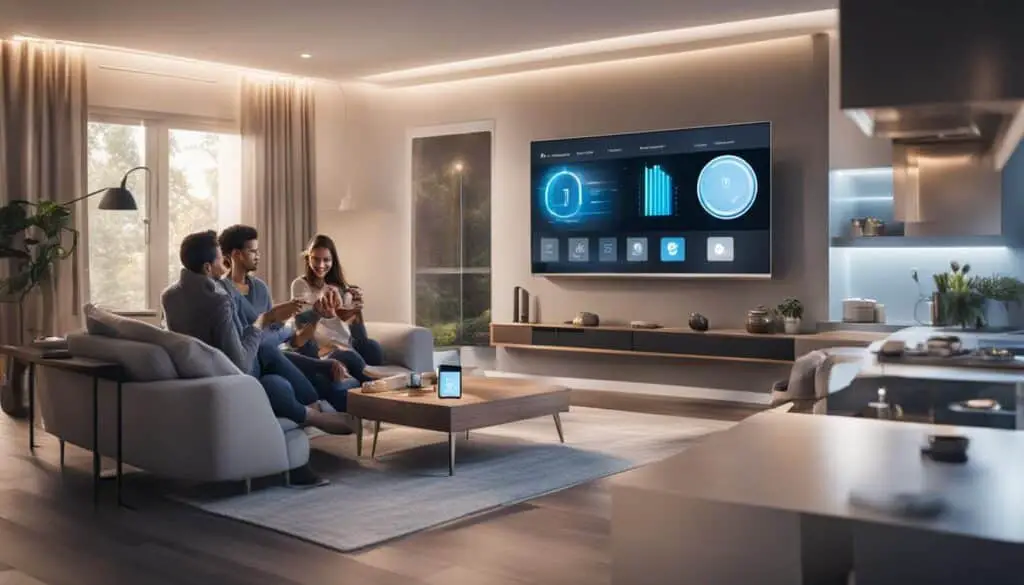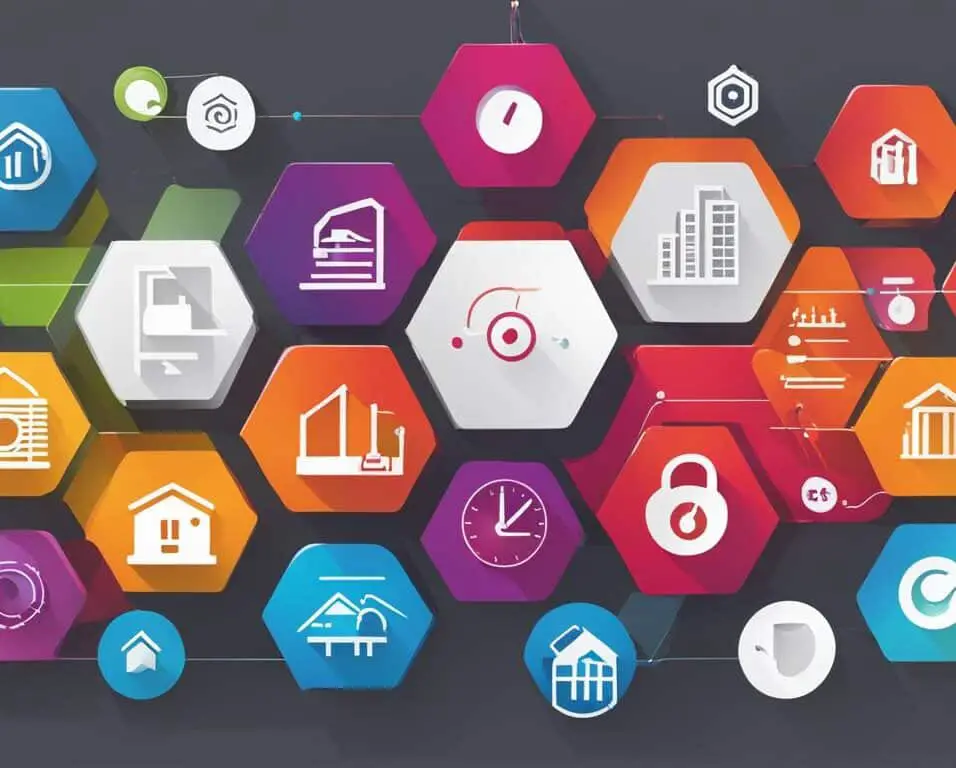How AI is Revolutionizing Home Automation Today
The integration of artificial intelligence (AI) into home automation systems is transforming the way we live. With the rise of AI-powered devices and technologies, smart homes are becoming more efficient, convenient, and personalized. Let’s delve into how AI is revolutionizing home automation today and explore the latest technology trends.
Key Takeaways:
- AI-powered devices and technologies are revolutionizing home automation.
- Smart homes are becoming more efficient, convenient, and personalized.
- The integration of AI enhances energy management, security, and convenience in smart homes.
- AI enables personalization and customized experiences in home automation.
- The future of AI in smart homes holds exciting possibilities, including healthcare integration and voice recognition technology.
The Impact of AI in Smart Homes
The integration of AI technology in smart homes has had a profound impact on our daily lives. With the advancements in AI, smart devices have become more intelligent, personalized, and efficient, enhancing convenience, energy efficiency, and security in our living spaces.
AI-powered devices, such as virtual assistants and smart sensors, play a key role in transforming traditional homes into smart homes. These devices are equipped with AI algorithms that enable them to learn and adapt to homeowners’ preferences, making the automation process seamless and personalized. For example, virtual assistants like Amazon Alexa and Google Assistant can understand voice commands, control various smart devices, and respond to queries, creating a more interactive and convenient home environment.
Smart sensors, powered by AI, provide enhanced security and energy efficiency. These sensors can detect motion, monitor environmental conditions, and adjust settings accordingly. For instance, AI-powered security systems can analyze live footage, identify potential threats, and send real-time alerts to homeowners, ensuring their safety. Additionally, AI algorithms can optimize energy consumption based on user behavior and environmental factors, resulting in reduced energy waste and lower utility bills.
One of the notable impacts of AI in smart homes is the ability to control various aspects of our living spaces with ease. Through AI technology, homeowners can adjust temperature settings, lighting, and even the ambiance of their homes using voice commands or through smartphone apps. AI-powered systems can learn individual preferences and automate routine tasks, providing a truly personalized experience.
Furthermore, AI technology enables interoperability among different smart devices, allowing them to work seamlessly together. This integration enhances the overall functionality and convenience of the smart home ecosystem. For example, an AI-powered smart thermostat can communicate with AI-powered appliances and lighting systems to optimize energy consumption based on occupancy and usage patterns.
In summary, AI has revolutionized smart homes by introducing intelligence, personalization, and efficiency. With AI-powered devices and systems, homeowners can enjoy a more convenient, comfortable, and secure living experience. The continuous advancements in AI technology promise an even brighter future for smart homes, where healthcare integration, voice recognition technology, and further customization will redefine the way we interact with our living spaces.
Enhancing Efficiency and Convenience with AI in Home Automation
AI is playing a crucial role in revolutionizing home automation, enhancing both efficiency and convenience for homeowners. By harnessing the power of AI technology, smart home systems can optimize energy management, provide personalized experiences, and automate routine tasks. Let’s explore how AI in home automation is transforming our living spaces.
Efficient Energy Management
One of the key benefits of AI in home automation is its ability to optimize energy consumption. AI-powered systems analyze consumption patterns, identify energy waste, and provide intelligent suggestions to reduce costs. For example, smart thermostats can learn homeowners’ temperature preferences and automatically adjust settings to maintain comfort while saving energy. By efficiently managing energy usage, AI-powered systems contribute to a more sustainable and eco-friendly lifestyle.
Enhanced Convenience
AI enables automation and personalization, enhancing convenience in smart homes. With AI-powered systems, homeowners can enjoy a seamless living experience by automating routine tasks. For instance, AI virtual assistants can schedule and control lighting, heating, and other devices based on individual preferences and daily routines.
“With AI in home automation, homeowners can experience an unparalleled level of convenience. From controlling devices with their voice to automating everyday tasks, AI makes smart homes truly ‘smart'” – Mark Johnson, Home Automation Expert
The convenience extends beyond daily routines to create customized experiences. AI in home automation can learn individual preferences and adapt accordingly. For example, AI-powered music systems can create personalized playlists based on listening habits, setting the perfect ambiance for any occasion.
AI in home automation is revolutionizing our living spaces, enhancing efficiency, and convenience. By optimizing energy management and providing personalized experiences, AI-powered systems contribute to a more sustainable and comfortable lifestyle. As technology continues to advance, the possibilities for AI in home automation are endless, making smart homes even smarter.

AI and Smart Home Security
The integration of artificial intelligence (AI) in smart home security has revolutionized the way we protect our homes and loved ones. Through the use of advanced surveillance systems and smart security devices, AI is making homes safer and giving homeowners peace of mind.
Advanced Surveillance for Enhanced Security
AI-powered cameras and sensors are at the forefront of advanced surveillance in smart homes. These devices can analyze live footage in real-time and detect potential threats, such as unauthorized intrusions or suspicious activities. By leveraging AI algorithms, smart security systems can provide instant alerts to homeowners, allowing them to take necessary action promptly.
“With AI-powered cameras and sensors, smart security systems can analyze live footage, detect potential threats, and provide real-time alerts to homeowners.”
The ability of AI to analyze visual data enables these smart security systems to differentiate between regular movements, such as pets or passing vehicles, and potential security breaches. This advanced detection capability reduces the likelihood of false alarms and ensures that homeowners are only alerted when a genuine threat is detected.
Automated Responses for Quick Action
In addition to real-time alerts, AI-powered smart security systems can also trigger automated responses in case of security breaches. For example, these systems can activate alarms, send notifications to homeowners’ smartphones, or even contact the authorities directly. This quick action can help deter potential intruders and significantly reduce response times in emergency situations.
Enhanced Security Features for Peace of Mind
By harnessing the power of AI, smart homes are equipped with enhanced security features that go beyond traditional alarm systems. AI-powered security devices can learn and adapt to changes in the environment, detecting irregular patterns or suspicious behaviors even before a breach occurs. This proactive approach to security provides homeowners with peace of mind, knowing that their homes are protected by intelligent and vigilant systems.
The Role of AI in Future Home Security
The future holds even greater potential for AI in home security. As AI algorithms continue to evolve, smart security systems will become more sophisticated in recognizing and analyzing complex security threats. Additionally, AI can integrate with other smart devices and technologies to create a comprehensive ecosystem that enables seamless communication and coordination for enhanced security.
As AI technology advances, we can expect further innovations in smart home security that cater to individual needs and preferences. From facial recognition technology to customized security protocols, AI will continue to push the boundaries of home security and provide homeowners with smart, efficient, and reliable protection.

| Benefits of AI in Smart Home Security | Description |
|---|---|
| Real-time threat detection | AI-powered surveillance systems can instantly detect potential security threats, ensuring a rapid response. |
| Reduced false alarms | AI algorithms can differentiate between regular movements and actual security breaches, minimizing false alarms. |
| Automated emergency responses | In case of a security breach, AI-powered systems can trigger automated responses, such as activating alarms or contacting authorities. |
| Proactive security measures | AI-enabled security devices can learn and adapt to changes in the environment, providing proactive protection. |
| Integration with other smart devices | AI can seamlessly integrate with other smart home devices, creating a comprehensive security ecosystem. |
AI and Energy Efficiency in Smart Homes
AI technology is revolutionizing energy efficiency in smart homes. With the help of AI algorithms, smart devices like thermostats and meters can optimize energy consumption by analyzing user behavior and environmental factors. These devices learn user preferences and adjust settings accordingly, resulting in reduced energy waste and lower utility bills.
Smart thermostats, powered by AI, play a crucial role in making homes more energy-efficient. They continuously monitor and analyze temperature patterns, adjusting heating and cooling systems to maintain optimal comfort while minimizing energy usage. By intelligently adapting to users’ routines and preferences, smart thermostats ensure that energy is only consumed when necessary, leading to significant savings over time.
Furthermore, AI-driven meters provide detailed insights into energy usage, allowing homeowners to identify areas of high consumption and make informed decisions about reducing energy waste. This data-driven approach empowers users to take proactive measures to improve energy efficiency and lower their carbon footprint.
Renewable energy integration is another aspect where AI is making a significant impact. By leveraging AI algorithms, homeowners can seamlessly incorporate renewable energy sources, such as solar panels, into their smart home systems. AI-powered systems optimize the use of renewable energy based on real-time factors like weather conditions, energy demands, and pricing. This integration reduces dependence on traditional energy sources, fosters sustainability, and contributes to a greener future.
Benefits of AI in Energy Efficiency:
- Optimized energy consumption based on user behavior and environmental factors.
- Reduced energy waste and lower utility bills.
- Improved comfort levels through intelligent adjustment of heating and cooling systems.
- Real-time insights into energy usage for informed decision-making.
- Seamless integration of renewable energy sources into smart home systems.
- Contribution to sustainability and a greener future.
“AI-powered devices and algorithms play a vital role in optimizing energy efficiency in smart homes. By analyzing user behavior, adapting settings, and integrating renewable energy sources, AI technology brings significant benefits to homeowners, both in terms of cost savings and environmental impact.”
With AI as a driving force, energy efficiency in smart homes is no longer a luxury but a sustainable and responsible choice. By harnessing the power of AI algorithms and integrating smart devices, homeowners can reduce their energy consumption, lower utility bills, and contribute to a greener future.
Personalization and AI in Smart Homes
AI-powered personalization is revolutionizing the way smart homes are tailored to individual needs. By leveraging AI algorithms, smart home systems can learn user preferences and behavior patterns, creating customized experiences that enhance the overall living experience.
Imagine coming home to a space that knows exactly how you like things. With AI, smart homes can automatically adjust temperature and lighting settings to your liking, creating a comfortable ambiance that suits your preference. Whether you prefer a cozy warm atmosphere or bright lighting for productivity, AI-powered systems make it effortless to achieve the perfect environment.
But personalization goes beyond temperature and lighting. AI-powered personal assistants, like the popular Amazon Alexa or Google Assistant, can understand your voice commands and perform a multitude of tasks. From playing your favorite music playlist to suggesting personalized recommendations, these assistants seamlessly integrate with your daily routines, enhancing convenience and enjoyment in your smart home.
“AI-powered personalization in smart homes brings us one step closer to living in homes that truly understand and cater to our unique needs and preferences.”
AI also enables personalized recommendations based on your habits and preferences. By analyzing data and patterns, smart home systems can suggest movies, books, or even recipes that align with your tastes. This level of customization adds a personal touch to your smart home experience, making it feel more intuitive and responsive.
Furthermore, AI-powered personalization extends to energy management. Smart thermostats equipped with AI algorithms can learn your temperature preferences over time and adjust settings accordingly. This ensures energy efficiency without compromising on comfort, helping you save on utility bills while minimizing environmental impact.
AI-powered personalization in smart homes brings us one step closer to living in homes that truly understand and cater to our unique needs and preferences. With the ability to learn, adapt, and anticipate our wants and desires, AI transforms our living spaces into truly customized environments.
Together, AI-powered personalization and smart home automation redefine the way we interact with our homes, making everyday living more convenient, comfortable, and enjoyable.
Key Takeaways:
- AI-powered personalization in smart homes creates customized experiences tailored to individual needs and preferences.
- Smart home systems using AI algorithms can adjust temperature, lighting, and other settings to create a personalized ambiance.
- AI-powered personal assistants offer convenience by performing tasks and providing suggestions based on user preferences.
- AI enables personalized recommendations for entertainment, based on user habits and preferences.
- Energy management in smart homes is optimized through AI-powered thermostats that learn and adapt to temperature preferences.
The Future of AI in Smart Homes
The future of AI in smart homes holds exciting possibilities. AI-powered smart homes are expected to further integrate with healthcare, enabling the monitoring of health conditions and providing real-time alerts in case of emergencies. Voice recognition technology is also expected to evolve, enhancing interaction with smart home devices and enabling seamless communication and control. As AI technology continues to advance, the smart homes of the future will become even more sophisticated, personalized, and intelligent.
Integration with Healthcare
The integration of AI in smart homes is poised to revolutionize healthcare. With the ability to monitor health conditions, AI-powered smart home devices can help individuals manage their well-being more effectively. For instance, advanced sensors can track vital signs, detect abnormalities, and provide real-time alerts to patients and healthcare providers. This integration enables remote health monitoring, early detection of health issues, and prompt medical interventions, ultimately improving patient outcomes and reducing healthcare costs.
Voice Recognition Technology
Voice recognition technology is another promising aspect of the future of AI in smart homes. As speech recognition algorithms continue to improve, users can interact with their smart home devices more naturally and effortlessly. Voice commands can control various aspects of the home, such as adjusting temperature, playing music, and managing daily schedules. With voice recognition technology becoming more accurate and responsive, smart homes will offer a seamless and intuitive user experience, enhancing convenience and efficiency.
Conclusion
Smart home automation is undergoing a significant transformation with the integration of AI technology. The benefits of AI in smart homes are evident, as it enhances efficiency, convenience, energy management, and security. By leveraging AI-powered personalization and anticipating future advancements in healthcare integration and voice recognition technology, the potential for smart homes is limitless. Embracing AI in home automation leads to a more seamless and enjoyable living experience for homeowners.
FAQ
How is AI revolutionizing home automation today?
AI-powered devices and technologies in smart homes are enhancing convenience, energy efficiency, and security by learning and adapting to homeowners’ preferences.
What impact does AI have in smart homes?
AI technology enhances efficiency and convenience in home automation, optimizing energy management, automating routine tasks, and personalizing experiences.
How does AI revolutionize home security?
AI-powered smart security systems analyze live footage, detect threats, provide real-time alerts, and trigger automated responses for enhanced security in smart homes.
How does AI drive energy efficiency in smart homes?
AI-powered devices in smart homes optimize energy consumption based on user behavior and environmental factors, reducing waste and integrating renewable energy sources.
How does AI enable personalization in smart homes?
AI-powered systems in smart homes learn user preferences and behavior patterns to create customized experiences, adjusting temperature, lighting, and providing personalized recommendations.
What is the future of AI in smart homes?
The future of AI in smart homes includes integration with healthcare for monitoring health conditions and advancements in voice recognition technology for seamless communication and control.
How is AI revolutionizing home automation?
The integration of AI technology in smart homes enhances efficiency, convenience, energy management, and security, creating a more seamless and enjoyable living experience for homeowners.








